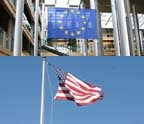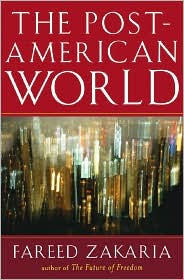Here's hoping Barack Hussein Obama, President-elect of the United States, will be the first one president world I want him to be. I wish him all the best.
Now that all the work and hullabaloo is over, I promise to get back to blogging.
For Citizens of the World

Economic growth is producing new centers of influence. And that's leading to greater national pride, confidence and assertiveness. But there are also powerful new countervailing forces—yes, of globalization and integration—that are working to mitigate nationalism and unilateralism.


Some relativists confuse two different senses in which judgments can be subjective. The view that moral judgments express desires means that they are, in one sense, subjective. Which judgments you will agree to depends on what desires you have, which is a feature of you. But, in this sense, factual judgments are subjective also. Which ones you will accept depends on what beliefs you have, which is similarly a feature of you. From the fact that beliefs are subjective in this way, therefore, it does not follow that they are subjective in the sense that you are entitled to make any judgments you like. Indeed, to go from the first claim to the second is to make one of the moves from "is" to "ought" that furrowed Hume's brow. It's to commit the naturalistic fallacy. So even on the Positivist view there is no route from the subjectivity of value judgments to a defense of toleration. Toleration is just another value.Not every cultural practice is acceptable in light of human rights. Tolerating all differences on cultural grounds is not cosmopolitanism. This gets into centuries-old, deep philosophical controversies, but I'll keep working on it. It intersects individual rights which I'll get into later.
"But costs have long been much higher in America than in poor countries, so this alone does not explain the new exodus. Two other factors are now at work. One is that the quality at the best hospitals in Asia and Latin America is now at least as good as it is at many hospitals in rich countries. The second, more worrying, factor is that America’s already imperfect insurance safety net is fraying."
"PEOPLE touch each other a lot, even strangers. We shake hands, slap backs, kiss and caress. Such behaviour can increase co-operation, which is good from an evolutionary point of view. It has even been shown that waitresses who touch patrons tend to be tipped more generously."

"WHETHER you are a gorilla, a four-year-old child, a politician or an Olympic athlete, the signs of victory are obvious for all to see: the chest inflates, the head is thrown back and the victor displays a strutting and confident air. Shame at being defeated is equally recognisable: the head bows, and sometimes the shoulders slump and the chest narrows too..."



There are categories of self-definition that are unfamiliar or uncomfortable to some people's sensibilities - including ethnonational identity, caste (common in India), or tribe (common in much of Africa and the Muslim world). But the fact that some people may find these categories unreal (since they know that beneath the skin humans are ultimately the same: put them in a room together with a game to play, and see how little they differ) does not make them any less real to those who believe in them.
Before it can implement any of these specific strategies, however, the United States must make a much broader adjustment. It needs to stop cowering in fear. It is fear that has created a climate of paranoia and panic in the United States and fear that has enabled our strategic missteps. Having spooked ourselves into believing that we have no option but to act fast and alone, preemptively and unilaterally, we have managed to destroy decades of goodwill, alienate allies, and embolden enemies, while solving few of the major problems we face. To recover its place in the world, America first has to recover it's confidence.



There was nothing subtle about that attempt to position Senator Obama as the Other, a candidate who might technically be American but who remained in some sense foreign, not sufficiently patriotic and certainly not one of us — the “us” being the genuine red-white-and-blue Americans who the ad was aimed at.
"Racial" antipathies have some roots in ethnic origin, but they are also generated, perhaps predominately, by differences of acquired culture - of language, dress, habits, morals, or religion. There is no cure for such antipathies except a broadened education. A knowledge of history may teach us that civilization is a co-operative product, that nearly all peoples have contributed to it; it is our common heritage and debt...
The world has come to the conclusion - more defiantly than should have been needed - that culture matters. The world is obvioulsy right - culture does matter. However, the real question is: "How does culture matter?" The confining of culture into stark and separated boxes of civilizations or religious identities...takes too narrow a view of cultural attributes. Other cultural generalizations, for example, about national, ethnic, or racial groups, can also present astonishingly limited and bleak understandings of the characteristics of the human beings involved. When a hazy perception of culture is combined with fatalism about the dominating power of culture, we are in effect, asked to be imaginary slaves of an illusory force.

Today power is dispersed. There is no permanent bipartisan governing class in Washington. Globally, power has gone multipolar, with the rise of China, India, Brazil and the rest.
But globally, people have no sense of shared citizenship. Everybody feels they have the right to say no, and in a multipolar world, many people have the power to do so. There is no mechanism to wield authority. There are few shared values on which to base a mechanism. The autocrats of the world don’t even want a mechanism because they are afraid that it would be used to interfere with their autocracy.This is the challenge. Finding shared values and building mechanisms that work. Brooks, the conservative, sees this as a conservative would, it's obvious to him that each of these poles of this multi-polar world each represents a different culture, and therefore common values are non-existent. That's too easy. In terms of free trade, none of the powers that be can afford to go backward. The status quo may hold for awhile, but if the growing economies of China and India and Brazil want to keep growing, they'll have to find a way to keep improving the international structure. The Chinese experiment with autocratic capitalism continues, but I'm of the school that thinks rising living standards will eventually force a more open political system.
The best idea floating around now is a League of Democracies, as John McCain and several Democrats have proposed. Nations with similar forms of government do seem to share cohering values. If democracies could concentrate authority in such a league, at least part of the world would have a mechanism for wielding authority. It may not be a return to Acheson, Marshall and the rest, but at least it slows the relentless slide towards drift and dissipation.I haven't yet given much thought to the League of Democracies concept. I do believe that democracy is the answer for all countries of the world because I think democracy is a universal value. (See Amartya Sen's Democracy as a Universal Value.) But I have questions to answer for myself first. Will the League once again make democracy a "western" notion since most members of the club will be western? Is an exclusionary league the best way to integrate non-democracies like China into the world system? What is the historical success of exclusionary international clubs like this?
That is because, put bluntly, Russia now thinks it got a bad deal when the old cold war ended. The OSCE promotes an interfering “western” agenda of human rights and open elections.Human rights and open elections are good things. Are they strictly "western"? One of the themes I'd like to develop with The Boundless Cosmopolitan, is the wrong-headedness of associating an idea with a culture, or with a place on the map. Ideas do indeed originate somewhere, a human being, or group of them, creates a concept, and though that person may be from the east or west, north or south, it's still a human idea. As a friend told me, dismissing an idea because of where it came from is like refusing to read a book because you didn't write it.
The main response should be that security is not just about powerful countries and blocks striking legalistic deals; it is also about values...If Russia now chokes on the notion of a Europe-wide commitment to political freedom, the rule of law and the rights of small countries to determine their future, that is troubling. But it is says more about what’s wrong with Russia than about anything else.
The Addis Ababa ICT forum was organized by the European Commission, the European Union's executive and regulatory body, the United Nations Commission for Africa (UNECA) and African, Caribbean and Pacific countries.

"What is much more disturbing is the way in which skilled young surfers—the very people whom the internet might have liberated from the shackles of state-sponsored ideologies—are using the wonders of electronics to stoke hatred between countries, races or religions. Sometimes these cyber-zealots seem to be acting at their governments’ behest—but often they are working on their own, determined to outdo their political masters in propagating dislike of some unspeakable foe."

Zakaria states this in a section titled, Is Culture Destiny?, where he discusses the waxing and waning of civilizations based on characteristics of their culture. Examples include the heights of Arab culture in science and commerce at a time that Europe was a backwater, and China's turn inward at a time when it was arguably the most technologically advanced civilization on the planet. It's important to me because it highlights the fact that cultures do change and cultural characteristics that create conflict between peoples must not always remain so. I would like to learn the mechanisms by which cultural changes occur so that cultural conflict can be reduced."The late Daniel Patrick Moynihan, America's leading scholar-senator, once said, "The central conservative truth is that it is culture, not politics, that determines the success of a society. The central liberal truth is that politics can change a culture and save it from itself." That gets it about right. Culture is important, terribly important. But it can change. Cultures are complex. At any given moment, certain attributes are prominent and seem immutable. And then politics and economics shift, and those attributes wane in importance, making space for others. The Arab world was once the center of science and trade. In recent decades, its chief exports have been oil and Islamic fundamentalism. Any cultural argument must be able to explain both periods of success and periods of failure."
